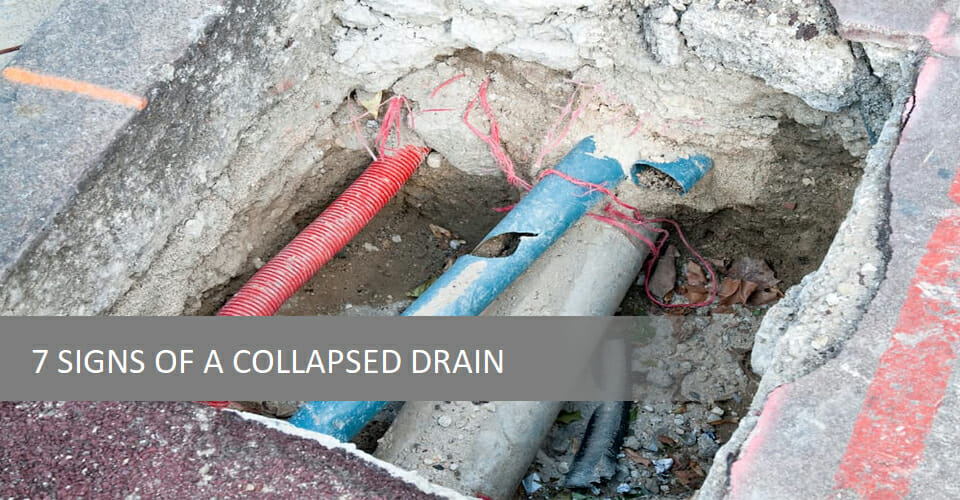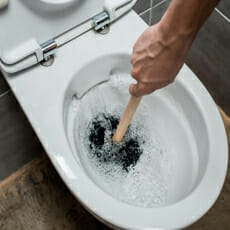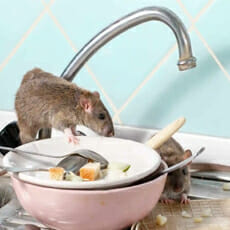We all know that feeling when we go to take a shower and the water starts backing up. Or when we flush the toilet and it starts making that gurgling sound.
But we might not realise that these could be signs of a much more serious problem: a collapsed drain.
What Is a Collapsed Drain?
A collapsed drain is exactly what it sounds like—a drain that has caved in or collapsed.
This can happen for a variety of reasons, but the most common cause is tree roots growing into and around the pipe. As the tree root intrusion grows, it puts pressure on the drain, which can cause it to break or collapse.
Other causes include heavy rains washing away dirt and soil around the pipe (leaving it unsupported) and the freezing and melting of groundwater.
Non-weather-related reasons you may have a collapsed drain include animals digging around the pipe, improper pipe alignment during installation, or simply old age.
Also Read: Blocked Drains Early Warning Signs
7 Signs of a Collapsed Drain
There are a few common signs that you might have a collapsed drain. If you notice any of the following, it’s time to call a professional for a repair:
1. Frequent Backups
Almost everyone has experienced a clogged sink or bathroom toilet at some point. But if you notice that water is backing up in multiple drains, or you are having frequent sewage backups, it could be a sign of bigger blockages.
If water is backing up in your sink and bathtub at the same time, it’s likely that you have a main sewer line clog. And this drainage issue could be due to a collapsed pipe.
 2. Gurgling Noises
2. Gurgling Noises
Remember that sound when you flush the toilet and it starts making that gurgling noise? Yeah, that’s not normal.
Water should go down the drain without a bubbling noise when you flush the toilet. If you hear gurgling, it means there is air in the line, which is a sign of a blockage. And that blockage could be caused by a collapsed drain.
3. Slow Drain in the Sink and Tub
If you notice that your tub and sink are draining slower than usual, it’s probably because there’s a clog in the drain. But if you’ve tried everything to get rid of the clog and it’s still not draining, it may be a bigger problem.
Additionally, having a single location with a flow problem is probably not a collapsed drainage issue. Still, if you have multiple slow drains, it could be due to collapsed drain pipes.
Related: 6 Ways to Unclog a Drain if a Snake Doesn’t Work
4. Bad Smell
If you have a foul smell coming from your drains, it means something in the pipes is causing wastewater to back up. And this could be because of a collapsed sewer line.
When drains collapse, they trap smelly sewage waste, creating an ideal environment for bacteria to grow. And that bacteria can cause a strong smell of sewage.
5. Pooling Water
The water from collapsed drain pipes has to go somewhere. It will often begin to pool around your house foundation or on your lawn. A damp yard can be unpleasant, but water around the foundation can lead to cracks and slowly undermine its structural integrity.
Also, the leaking wastewater contains a significant amount of nitrogen, which can act as a fertiliser. This may cause the grass to grow more quickly or greener around the pooling water, which can be another sign of a collapsed pipe on your property.
The water from the drainage system can lead to soil erosion or ground subsidence. This can cause your foundations to settle unevenly, leading to unseen structural damage covered by your floor.
It can also remove soil from around the sewer piping, leading to more collapse. Thus, repairing the drain and getting it fixed is critical to prevent a more severe problem later.
6. Rats in the Home
When a drain is compromised, it allows rats and other animals to enter your home through the local sewer systems.
Thus, if you start seeing rodents or cockroaches in your home, these are signs that you may have a collapsed drain.
Rodents can carry diseases, so getting rid of them as soon as possible is essential. Similarly, you want to fix your drainage problem to prevent their return.
7. Mould and Dampness
Another likely sign of a collapsed drain is finding mould and damp patches on the walls of your home. When you have sewage blockages, it creates pressure on the fluid in the pipes. If the pressure is such that it causes a leak, mould and dampness can result and create an unhealthy living environment.
Furthermore, the leak can result in structural damage like sagging floors or cracked walls. Thus, it’s important to seek professional assistance to check and repair collapsed drains.
What Can I Do to Prevent Drain Collapses?

Additionally, be sure to let them know if you’ve noticed any signs of a blocked drain pipe or water backup so they can check for any obstruction in the pipe. They may also recommend getting a CCTV survey or camera inspection to get an idea of the condition of your pipes and main sewer line.
Lastly, keep an eye out for any pooling water around your foundation, as this could signify that your sewer line is already damaged and needs to be repaired or replaced.
If you need a plumbing expert to help you prevent collapsed drains. Check these two links below.
What to Do About a Collapsed Drain?
Unlike many plumbing issues, there is no do-it-yourself fix for collapsed drains. If you suspect you have a collapsed drain, the best thing to do is call a professional.
A plumber can locate the problem and determine the best course of action. In many cases, replacing the old drain pipeline is the only way of fixing a collapsed sewer line.
The professionals at Damien McEvoy Plumbing have the experience and expertise to evaluate the cause of your problem. And if the issue is a collapsed drain, we can repair it quickly and efficiently. Contact us today at (02) 8599 4593 to schedule a consultation.


 2. Gurgling Noises
2. Gurgling Noises 

 Enquire
Enquire